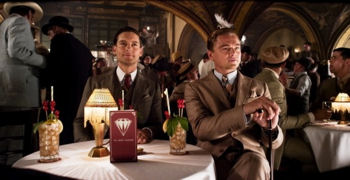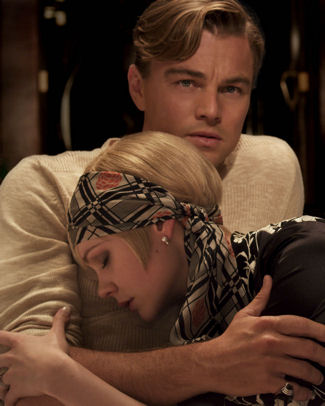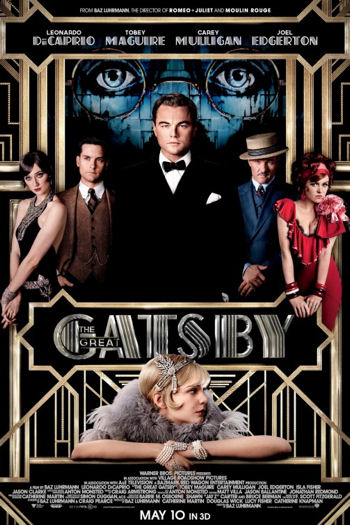|
The Great Gatsby
The Jazz Age was a time of excess, at least for the haves. Despite the perils of Prohibition, liquor flowed freely, music got wild, and the partying just kept going.
That's the way F. Scott Fitzgerald portrayed it, through a lens darkly, in his great American novel The Great Gatsby. It's a novel of excess and the dark side of the American dream, so why not put it in the hands of a director addicted to excess, Baz Luhrmann?
Though not strictly within the realm of Lurhman's "red curtain" productions, The Great Gatsby is suffused with their sensibility. As in Romeo + Juliet, the film steeps itself in the language of a master, with the very text illuminating the screen. Luhrmann uses the conceit that Nick Carraway (Tobey Maguire) himself is actually writing the narrative as a means of expunging his guilt and anger over the events. His careful cursive dances off of the paper, into the air, and into a roiling scape of scenery and sorrow.
Like Moulin Rouge, it seems that anything goes in terms of sounds and visuals in order to express Luhrmann's intent. While Jay-Z assists composer Craig Armstrong in an effervescent soundtrack, the mixture of period music with a hip hop sensibility works surprisingly well. People celebrate wantonly no matter where they are in history.
 But Luhrmann amps up the spectacle and cacophony at the cost of some mystery. Working with screenwriter Craig Pearce, the director reveals too much too soon about the titular Jay Gatsby (Leonardo DiCaprio). As soon as party guests start spreading rumors, Maguire's world-weary narration fills in the gaps that in the original novel made a moving elegy at the end. That's Luhrmann giving in to his urges to just keep piling it on the nose, even making sure that we see all the neon arrows pointing to the significance of the green light at the end of the dock. But Luhrmann amps up the spectacle and cacophony at the cost of some mystery. Working with screenwriter Craig Pearce, the director reveals too much too soon about the titular Jay Gatsby (Leonardo DiCaprio). As soon as party guests start spreading rumors, Maguire's world-weary narration fills in the gaps that in the original novel made a moving elegy at the end. That's Luhrmann giving in to his urges to just keep piling it on the nose, even making sure that we see all the neon arrows pointing to the significance of the green light at the end of the dock.
In a film, though, how else could he play it? What Fitzgerald wrote on the page, and Maguire narrates, sometimes just looks silly on screen, even though it's exactly the way it was written. The sillhouette of Gatsby yearns for that green light, and if you're not caught up in his pain, the shot evokes laughs.
That follows through to Gatsby's formal introduction, literally surrounded by fireworks and rising out of a confusion of voices and innuendo. DiCaprio turns his star power on full wattage to out sparkle the incendiaries, and that, too, seems a bit silly. But that also fits with one of Gatsby's flaws -- so desirous of being what people project onto him, he cannot help but occasionally get mired in cheese.
 At 39, DiCaprio may be too old for the role, but he exudes charming unctuousness. To be fair, Jay Gatsby has lived pretty intensely, so he might very well look older. Luckily, the much younger Carey Mulligan doesn't have to generate much gravitas as Daisy Buchanan, so the age gap doesn't seem quite so wide, or at least doesn't matter so much. At 39, DiCaprio may be too old for the role, but he exudes charming unctuousness. To be fair, Jay Gatsby has lived pretty intensely, so he might very well look older. Luckily, the much younger Carey Mulligan doesn't have to generate much gravitas as Daisy Buchanan, so the age gap doesn't seem quite so wide, or at least doesn't matter so much.
Mulligan nails the role, playing flightiness to the hilt with a layer of uncomprehending pain underneath. At times, one can see what Gatsby sees, more than just a representation of wealth and success. In another time and situation, Daisy might have been something more than the calculating "beautiful little fool" that she believes is all the world has room for her to be.
In the smaller roles, Luhrmann has cast well. Joel Edgerton simmers with a gravelly violence as Daisy's husband Tom Buchanan, but he's also an intelligent man -- one who plays only as smart as the room needs him to be. As Tom's mistress Myrtle, Isla Fisher burns red as much as she can, a tremendous character turn.
On the surface, the oddest casting is of Ahmitab Bachchan as the gambler Meyer Wolfsheim, but the Indian actor embodies something very animalistic in the character that Fitzgerald's prose could only hint at. Again, maybe it's a bit too on the nose, but that's Luhrmann.
Thus your enjoyment of The Great Gatsby may really hinge upon your tolerance for Luhrmann's excesses. Fitzgerald struggled and sweated to make his novel one that reveals new meanings with each reading; Luhrmann has fileted that and laid out as much of it to see as possible. The story is still relevant; the director just can't resist giving it a goose to attract a modern audience.
Which brings us to the film's 3D version -- it's actually worth seeing it that way. Just as Scorsese used 3D as a specific storytelling tool in Hugo, Luhrmann shoots in 3D as a crucial part of his lexicon. It allows the film to occasionally distance itself from us, as if we're watching postcards sent from Nick Carraway's breakdown. And as the director often employs miniatures and layers of scenery, the 3D makes the artifice stand out even more, but to cool effect.
It isn't a subtle film, and of course the book remains something that everybody should read. (If they don't already have to in school.) But The Great Gatsby, for all its flaws, is that rare summer movie -- full of froth, but anchored to something to chew on.
Ultimately, it's only good, not great. but it's also hard to imagine how it could be done any better.
|

 But Luhrmann amps up the spectacle and cacophony at the cost of some mystery. Working with screenwriter Craig Pearce, the director reveals too much too soon about the titular Jay Gatsby (Leonardo DiCaprio). As soon as party guests start spreading rumors, Maguire's world-weary narration fills in the gaps that in the original novel made a moving elegy at the end. That's Luhrmann giving in to his urges to just keep piling it on the nose, even making sure that we see all the neon arrows pointing to the significance of the green light at the end of the dock.
But Luhrmann amps up the spectacle and cacophony at the cost of some mystery. Working with screenwriter Craig Pearce, the director reveals too much too soon about the titular Jay Gatsby (Leonardo DiCaprio). As soon as party guests start spreading rumors, Maguire's world-weary narration fills in the gaps that in the original novel made a moving elegy at the end. That's Luhrmann giving in to his urges to just keep piling it on the nose, even making sure that we see all the neon arrows pointing to the significance of the green light at the end of the dock.
 At 39, DiCaprio may be too old for the role, but he exudes charming unctuousness. To be fair, Jay Gatsby has lived pretty intensely, so he might very well look older. Luckily, the much younger Carey Mulligan doesn't have to generate much gravitas as Daisy Buchanan, so the age gap doesn't seem quite so wide, or at least doesn't matter so much.
At 39, DiCaprio may be too old for the role, but he exudes charming unctuousness. To be fair, Jay Gatsby has lived pretty intensely, so he might very well look older. Luckily, the much younger Carey Mulligan doesn't have to generate much gravitas as Daisy Buchanan, so the age gap doesn't seem quite so wide, or at least doesn't matter so much.





